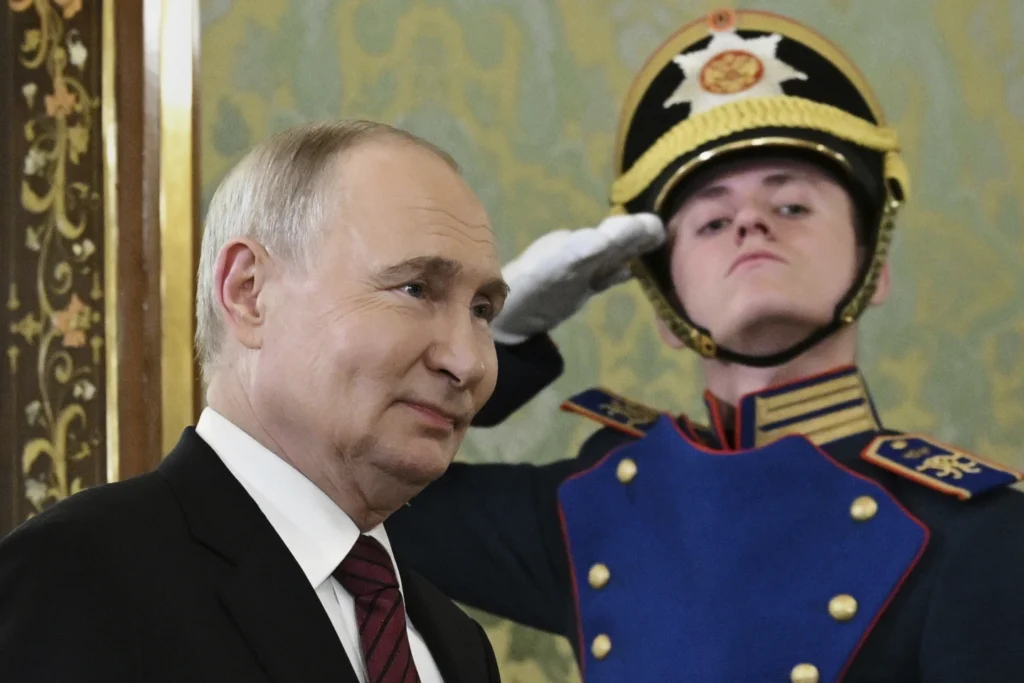ISTANBUL — Russian President Vladimir Putin has proposed restarting direct peace talks with Ukraine in Istanbul on May 15, without preconditions, a move that follows increasing international calls for an unconditional 30-day ceasefire and fresh threats of sanctions against Moscow if it refuses to de-escalate the war.

Speaking early Sunday, Putin invoked the failed 2022 peace talks—held in Istanbul shortly after Russia’s full-scale invasion—and expressed a willingness to “restart” negotiations without demands, while still leaving room for a ceasefire to be negotiated during those discussions.
“We are committed to serious negotiations with Ukraine,” Putin told reporters. “We do not rule out agreeing to a ceasefire as a result of direct talks.”
The proposal came on the heels of a unified ceasefire demand issued Saturday by the leaders of France, the United Kingdom, Germany, and Poland, who warned that Moscow would face sweeping new sanctions if it did not comply with a 30-day truce starting Monday. U.S. President Donald Trump, who the European leaders consulted by phone, has also endorsed the ceasefire effort and renewed his call for “very high-level talks,” claiming the sides are “very close to a deal.”
Ukrainian President Volodymyr Zelenskyy has stated that he is open to negotiations, but only after Russia halts its attacks.
Putin said Russia had already initiated several ceasefire offers, including a halt on strikes targeting Ukraine’s energy infrastructure, a 30-hour Easter truce, and a unilateral ceasefire from May 8–10—all of which Ukrainian officials claim were violated by Russian forces.
On Sunday, Putin accused Ukraine of undermining peace efforts and launching renewed attacks on Russian targets. He reiterated that Moscow seeks a “lasting peace” rather than a temporary truce that allows Kyiv to regroup and rearm. He added that he would speak with Turkish President Recep Tayyip Erdoğan about facilitating the May 15 talks.
Talks between Russian and Ukrainian officials mediated by Turkey in March 2022 failed to yield results. That proposed agreement included Ukrainian neutrality and limits on Kyiv’s armed forces, while deferring the fate of Russian-occupied regions—terms Ukraine and its Western allies rejected.
“Those who truly want peace cannot but support our proposal,” Putin said.
At a press conference in Kyiv on Saturday, Zelenskyy stood alongside European leaders, calling their presence “a very important signal” of support. In a joint statement published on the Ukrainian president’s website, the five nations called for a ceasefire “lasting at least 30 days,” saying any attempt by Russia to impose conditions would be seen as an effort to prolong the war.
French President Emmanuel Macron said the United States would lead monitoring efforts, with European support, and warned of “massive sanctions…prepared and coordinated” between Europe and the U.S. should Russia breach the ceasefire.
Macron was joined in Kyiv by British Prime Minister Keir Starmer, German Chancellor Friedrich Merz, and Polish Prime Minister Donald Tusk. “This is Europe stepping up, showing our solidarity with Ukraine,” Starmer said.
Trump’s special envoy to Ukraine, retired Lt. Gen. Keith Kellogg, said Saturday the proposed 30-day truce would ban attacks on land, sea, and air, as well as on infrastructure—describing it as the first step toward ending the largest conflict in Europe since World War II.
Despite the ceasefire push, Russia has continued to target civilian areas. Ukrainian officials reported that shelling in the northern Sumy region killed three and wounded four on Saturday. A drone strike on Kherson also claimed one life, according to regional authorities.
The U.S. Embassy in Kyiv warned Friday of a “potentially significant” Russian airstrike in the coming days. The alert follows reports of a no-fly zone being imposed by Moscow over the Kapustin Yar missile complex—a move that also preceded a hypersonic missile launch last November.
Putin used Saturday’s Victory Day commemorations in Moscow to meet with foreign dignitaries, including leaders from Vietnam, Zimbabwe, Burkina Faso, and the Palestinian Authority—an attempt to project that Russia remains globally engaged despite the West’s efforts at diplomatic isolation.
Meanwhile, Ukraine’s Western partners are intensifying military aid and discussions on long-term security guarantees. Macron suggested that building up Ukraine’s defense capabilities and possibly deploying European forces could serve as a deterrent to future Russian aggression. However, no firm commitments were made on NATO membership, which remains Kyiv’s preferred security outcome.
While President Trump has supported a diplomatic push, he recently expressed doubt over Putin’s willingness to reach a peace agreement and signaled openness to tougher sanctions if necessary. Critics say his past suggestions that Ukraine cede territory to Russia have hampered progress.
Still, Ukraine’s European allies insist Kyiv’s fate is intertwined with the continent’s stability and have pledged continued support, regardless of Washington’s shifting position.
AP



